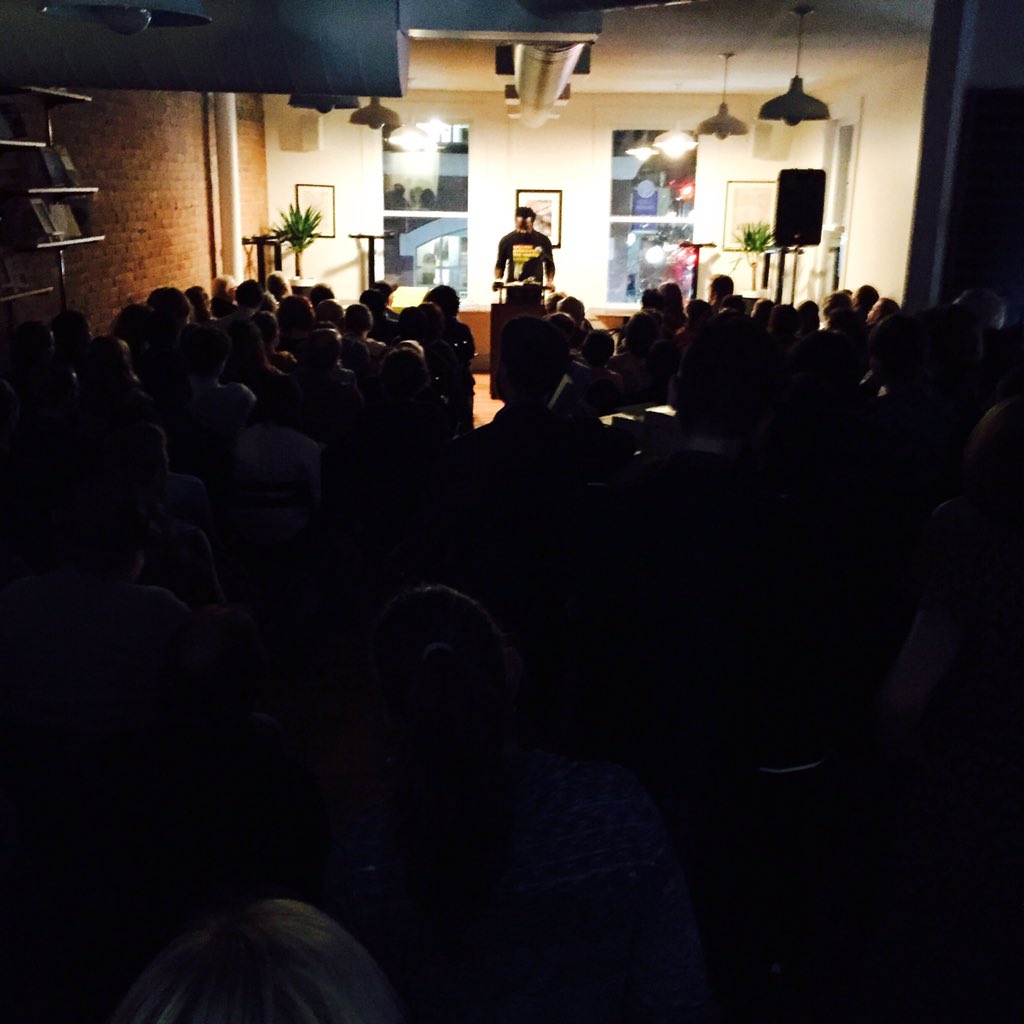
Wearing a tight Naked Lunch shirt and sporting shoulder-length dreadlocks, Marlon James seemed younger than his 45 years. This matched the way he behaved. He jested. He threw shade. He smiled and laughed with us in a way that felt whole, like the words weren’t perfectly pre-planned, like there wasn’t a stage. Marlon James does not act like a college professor, at least, not like the ones I’ve had. Nor does he act like a writer who just won the Booker.
When he read, he read as if he were his characters, as if they were temporal beings making use of his body. There were two passages that stood out most (to me, at least)–possibly because they had the audience howling, but probably because they were raunchy and had there been children in the audience, it would have been best to cover their ears. The first of these passages was when one of his Jamaican characters described the various kinds and qualities of sexual relations she had with European men of various countries. They all had their positives and drawbacks and while no singular country rose above the rest, the French were definitely painted in the worst light. After Marlon finished reading this scene, one particularly interested member of the audience asked him how he knew all these things about having sex with European men. According to Marlon James, some parts of an author’s novel are autobiographical, some are not. “Parts.”
The second striking passage where when that same character (now a home-care worker in New York) was exchanging racist jokes with an old white man she was supposed to be taking care of. This being Ann Arbor, of course, the mostly-white audience only felt comfortable laughing at the jokes making fun of white people. But still, the scene was funny and most of us cackled with enthusiasm.
These–these sexual escapades, these racist jokes–were the words of Booker-Prize winning novel. These were the words, out of the hundreds of thousands of other words, that were chosen to win the prize. They might not be the words you expected. Even going in knowing what this book was about, they were not the words I expected. That is probably a good thing.
It is easy to get an idea in your head about what it means to be literary. It is easy to imagine a literary author as some pale shut-in hunched over his type-writer, clanking away at his latest masterpiece, surrounded by emptied, tea-stained mugs and pages and pages blotted with ink. When that shut-in finally emerges, it is easy to visualize him standing up to that podium, dressed in some sort of brown suit–maybe meekly smiling, maybe too haughty even for that–lowering his glasses and reading his words softly and solemnly as if reciting them at his mother’s funeral. It is very easy to fall into this trap, this idea of what a writer is.
Perhaps your own exact vision of a writer differs from mine here and there, but it probably exists and if it exists, Marlon James probably does not greatly resemble that image. Nor does his book resemble an easy definition of literary (although it is the lengthy tome favored by judges of literature), but despite not being Booker-bait, it still won. And it’s very good thing that a book like A Brief History of Seven Killings written by a man like Marlon James can win an award like the Booker, because ultimately the concept of “literary” and what is and what isn’t worthy is all arbitrary and always either expanding or shrinking, encompassing or excluding, and when the same award goes to the same people who write the same kind of books, it is easy to forget about the authors on the edge of literary, the authors with something else to say as they push and shove and scrape at that boundary, the authors we will remember fifty years from now because their book was different. It is important and exciting to see these different voices win these awards, to remember what else is out there.
I, for one, am greatly looking forward to reading (with Marlon’s voice in my head) A Brief History of Seven Killings.


